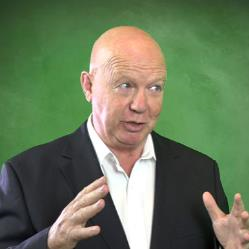 "Coach salespeople on the inputs" - interview by John Smibert.
"Coach salespeople on the inputs" - interview by John Smibert.
 In my previous discussion with Dean Kelly we discussed how sales managers - who want answers to "when the deal will close" and "how big it is" - should not ask those questions of the salesperson. Dean said they need to have a more customer focussed conversation with their sales team - one that will reinforce them having the correct conversation with their customers.
In my previous discussion with Dean Kelly we discussed how sales managers - who want answers to "when the deal will close" and "how big it is" - should not ask those questions of the salesperson. Dean said they need to have a more customer focussed conversation with their sales team - one that will reinforce them having the correct conversation with their customers.
This led me to ask Dean how sales managers can be better coaches.
Dean again emphasised that sales managers - no matter what the temptation - should not focus their attention on the outcomes such as orders and revenue when coaching. They should "focus on the inputs rather than focusing on the results".
He uses a number of sports coaching analogies to explain this. He stressed that they couch on aspects relative to the leading, or leaning indicators in the game. In sales these indicators that are relative to activities much earlier in the sales process than the close.
See the full interview below to learn more.
Dean Kelly is the Sales Deal Mechanic.
Interview:
John: I've got Dean Kelly with me again, the "deal mechanic" - welcome back, Dean!
Dean: Thank you, John! Thank you for having me!
John: Last time you raised some very interesting things that sales managers should ask the salesperson, rather than "When's the deal coming, and what's the size of the deal?" - questions that would help the salesperson focus on the customer. That led me to thinking that I'd like to ask you more about how you think sales managers should be better coaches. What are the sorts of things sales managers should focus on, and do, to demonstrate that they are good coaches.
Dean: This is a tough question, because in the last probably 20 years I believe there's been a big shift in sales management, because we've started focusing with CRMs, and with IT solutions in particular that almost sell themselves, on to the results rather than on the process to get to the results. One of the things managers can do is focus on the inputs rather than focusing on the outputs or the results.
John: Yeah. "When are we going to get the order?" is an output. "How much revenue is there? " is an output.
Dean: Exactly. And if I do all the things in the front well, the outcome is inevitable; we'll get a deal. If I qualify well up front, the deal will happen. If I do the right things and I create the conversation and the differentiation and create the value for the client in their mind, then it's highly likely I'll be differentiated when I get to the end. So, it's about focusing on what are the things as a manager you need that are critical inputs, or leading and leaning indicators, that are going to deliver the outcome? Now, the easy analogy for this is on the sports field.
John: The coach on the sports field.
Dean: A coach of a sports team. Whether it's American football - or it's English soccer or European soccer football, or it's even rugby or football down here - just think of how you'd break up those measures and those metrics when you watch your team play. In American football they talk about completed passes, because if I do completed passes I make yards, if I do yards I get first downs, if I get first downs I'm making territory, I'll get opportunity. In football, or as in English soccer and the like, it's about possession. If I have possession and more passes, I'll move up the field, I'll have shots on goal.
Leading indicators would be how many free kicks in the attacking half, or how many attacking corners I get, how many shots on goal; they're all leading indicators that mean the result is more likely. Rugby works the same way. So, to me, one of the things managers can do is balance their focus, because they're never going to take their eye off the results - I get that. But they've got to balance that, saying "What are the inputs that drive those results?"
John: And coaching and driving the activity on those inputs, and then the qualification of those, the evaluation of how well you're doing, and the assistance to do that better.
Dean: Can I say... You're opening up a big can of worms here, because this is a bigger, bigger topic than just a few minutes. Has anyone defined what "good" looks like? What does a good meeting look like? Has anyone defined it? Can you coach your team to what a good meeting looks like? On the sports field it's a lot easier, but in the business sense what is a good meeting? Because once you define what "good" looks like, you can actually coach to it. But so many companies have never defined that, and so many managers don't do "ride-alongs" enough to watch their people, to coach them on being better. They're sitting at home, or sitting in the office, waiting for the result "How did you go at that meeting today?"
John: It's like a sports coach sitting back in the office and not being there during training, and not being there at the game.
Dean: And then coaching you on Monday when they read the paper, and going "Oh, you lost! Well, what do you think went wrong? Why do you think..." I mean, if we introduced ourselves as that sports coach, people would go "You're crazy - no wonder your team's losing!"
John: I don't want to be too derogatory about sales managers, because I think a lot do it very well, but there's a lot that don't, and hopefully this message can be very valuable for those.
Dean: Well, as a simple task. Just write down for your favourite sport what are the leading indicators, what leaning indicators result from those, and then what are the lagging indicators. And then say "Right, if that's what it is for my favourite sport, what would it look like for my sales team?" It's meetings, it's quality of meetings, it's what do we get out of the meetings. Do we get an advance rather than a continuation, because that's a leading indicator of the client actually buying in to moving the deal forward. Simple things like that can make a profound difference in velocity through stages of the pipeline, through the stages of your pipeline. So much is based on the leading indicators that drive lagging.
John: Great advice. I know, having been a sales coach for most of my life, I've really struggled sometimes to really coach well, and bit by bit we've had to learn on the job. And I think more and more we've got to help sales leaders, sales managers learn a lot not just on the job but through good coaching and training through people like yourself - thank you!
Dean: Thank you!
****************
More of Dean Kelly:
***************

Your Invitation: I invite you to join the Sales Leader Forum group on LinkedIn where you can experience informative discussions with your peers and sales thought leaders on subjects like the one we have discussed here. I also invite you to subscribe to the
- Sales Leader Resource Centre here
- Sales Leader YouTube channel here (300+ sales leadership videos)
Please Share: If you valued this article, please share via your Twitter, LinkedIn, Google+ and Facebook social media platforms. I encourage you to join the conversation or ask questions. So feel free to add a comment on this post - I promise to respond. If inclined please follow my LinkedIn post page here.
Want to touch base? If you have questions please feel free to contact me - email: john.smibert(at)salesleaderforums.com, Phone: +61 404857893 or Skype: john.smibert